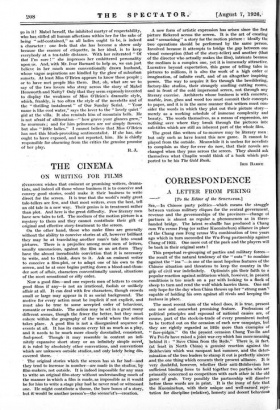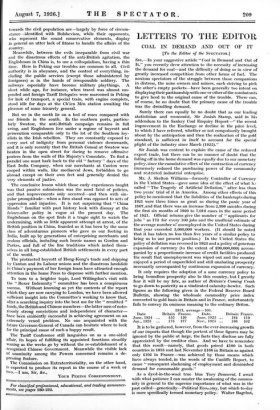CORRESPONDENCE
A LETTER FROM PEKING
[To the Editor of the SPECTATOR.] SIR,—In Chinese party politics—which means the struggle between various military cliques for the central government, revenue and the governorships of the provinces—change of partners is almost as regular a phenomenon as in three- handed bridge. The latest re-shuffle has produced a Chang cum Wu versus Feng (or rather Kuominchun) alliance in place of the Chang cum Feng versus Wu combination of two years ago which in turn succeeded the Wu-Feng partnership against Chang of 1922. One more cut of the pack and the players will be back in their original seats !
This perpetual re-grouping of parties and military forces— the result of the natural tendency of the " outs " to combine against the " ins "—is one of the most hopeless features of the Chinese situation and threatens to keep the. country in the grip of civil war indefinitely. Optimists pin their faith to a popular reaction against militarism which, however, in present conditions is too much on a par with looking to a flock of sheep to turn and rend the wolf which harries them. One earl only hope for the day when China throws up her "strong man 't capable of holding his own against all rivals and keeping the tuchuns in place..
The most recent turn of the wheel does, it is true, present one new and somewhat promising feature. Pnifessions of political principles and espousal of national causes are, of course, part of the stock-in-trade of every prominent tuchui to be trotted out on the occasion of each new campaign; but they are rightly regarded as. little more than ekamples of " face-pidgin." On the present occasion Chang tio-lin and Wu .
Pei-fu have raised a joint war-cry which his more meaning
behind it : "Sive China from the Reds."- There is, in fact, (at* least in North China) a genuine -reaction against the `Bohlhevisin which was rampant last summer, and the deter'. 'urination of the two leaders to stamp it out is perfectly sincere and the one thing which cements their present 'alliance. It is very doubtful, however, ivhether, their anti-Bolshevism has sufficient binding force to hold together two parties who are primarily concerned as competitors with each other in the old game of grab. Very possibly the partnership will dissolve before these words are in print... It is the irony of fate that the Kuominchun, with their unique and well-earned repu- tation for discipline (relative), honesty and decent behaviour
towards the civil population are—largely by force of circum- stance—identified with Bolshevism, while their opponents, who represent the sound conservative elements, display in general an utter lack of fitness to handle the affairs of the country.
Meanwhile, between the evils inseparable from civil war and the disastrous effects of the anti-British agitation, the Englishman in China is, to use a colloquialism, having a thin time. Here in Peking our troubles are common to all. Civil authority is in abeyance, and the control of everything, in- cluding the public services (except those administered by foreigners) is in the hands of irresponsible soldiery. The railways especially have become military playthings. A short while ago, for instance, when travel was almost sus- pended and foreign Tariff Delegates were marooned in Peking for lack of transport, a special train, with engine complete, stood idle for days at the Ch'ien Men station awaiting the pleasure of some leisurely general.
But we in the north lie on a bed of roses compared with our friends in the south. In the southern ports, particu- larly Swatow, the anti-British campaign remains in full swing, and Englishmen live under a regime of boycott and persecution comparable only to the lot of the Southern loy- alists in the Irish rebellion. They are constantly exposed to every sort of indignity from personal violence downwards, and it is only recently that the British Consul at Swatow was beaten in the open street for daring to remove offensive posters from the walls of His Majesty's Consulate. To find a parallel one must hark back to the old " factory " days of the East India Company, when our merchants at Canton were cooped within walls, like mediaeval Jews, forbidden to go abroad except on their own feet and generally denied the very elements of justice.
The conclusive lesson which those early experiences taught was that passive submission was the most fatal of policies, and that improvements only occurred—and then with sin- gular promptitude—when a firm stand was opposed to acts of oppression and injustice. It is not surprising that " China Hands " familiar with past history look with dismay at the laissez-aller policy in vogue at the present day. The Englishman on the spot finds it a tragic sight to watch the undermining, with so little apparent attempt at arrest, of the British position in China, founded as it has been by the same class of adventurous pioneers who gave us our footing in India, built up by generations of enterprising merchants and zealous officials, including such heroic names as Gordon and Parkes, and full of the fine traditions which imbed them- selves in all long-established British settlements in every part of the world.
The protracted boycott of Hong-Kong's trade and shipping by Canton and its Labour unions and the disastrous landslide in China's payment of her foreign loans have attracted enough attention in the home Press to dispense with further mention.
To turn to a brighter topic, Lord Willingdon's visit with the "Boxer Indemnity " committee has been a conspicuous success. Without knowing as yet the contents of the report which they are now carrying to London, we have been allowed sufficient insight into the Committee's working to know that,
after a searching inquiry into the best use for the " remitted " funds, the British and Chinese members—the latter men of noto- riously ,strong convictions and independence of character—
have been eminently successful in achieving agreement on an extremely vexed problem. No one acquainted with the future Governor-General of Canada can hesitate where to look for the principal cause of such a happy result.
The Tariff Conference still languishes on as a one-sided affair, its hopes of fulfilling its appointed functions steadily
waning as the weeks go by without the re-establishment of a recognized Chinese Government. Meanwhile the visible lack of unanimity among the Powers concerned remains a de- pressing feature.
The Commission on Extraterritoriality, on the other hand, is expected to produce its report in the course of a week or two.—I am, Sir, &c.,
YOUR PEKING CORRESPONDENT.







































 Previous page
Previous page